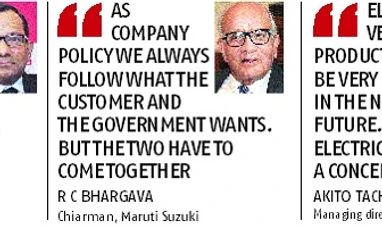The non-existent domestic electric vehicle segment is making headlines as it has begun to see a few recipes for growth: A low tax under the GST, interest from global electric carmaker Tesla, and a commitment from home-grown auto major Mahindra & Mahindra (M&M). On top of these, it’s the government’s ambitious vision to have an all-electric fleet in the country by 2030.
Days after the goods and services tax (GST) rate on electric vehicles was fixed at 12 per cent (against the lowest tax of 28 per cent on the smallest petrol car), M&M, the only Indian company to make electric cars, has announced a new facility for battery packs to power its electric vehicles. The company said it would produce e-autos, a bigger version of the e-rickshaws.
“We are taking a leap of faith as we expect a steep ramp-up in demand in the coming years,” Pawan Goenka, managing director, M&M, said last month. After a not-so-successful attempt to sell electric cars for personal mobility for years, M&M now sees an opportunity in the public mobility space.
Last week, it partnered with cab aggregator Ola for an electric mobility project in Nagpur. M&M is supplying a fleet of 100 e2o Plus hatchbacks to this project that will also have e-rickshaws, autos and buses. Ola has set up 50 charging stations in Nagpur. “This project will pave the way for wider adoption of electric vehicles,” Goenka said. Some state transport authorities have also shown interest in the electric buses.
While M&M was drawing future plans in electric vehicles after the GST announcement, Elon Musk-led Tesla’s India entry was turning uncertain. Musk tweeted last month that India had a 30 per cent local sourcing norm, though the supply didn’t exist. The government subsequently responded to Musk’s tweet by clarifying that India’s FDI policy does not mandate manufacturers to comply with any minimum local component sourcing norm.
Tesla had opened bookings for its most affordable Model 3 sedan in India in April, raising interest among tech leaders such as Vijay Shekhar Sharma and Vishal Gondal.
Against the backdrop of this environment, Musk lauded India’s plan to move to an all-electric vehicle country by 2030.
M&M Chairman Anand Mahindra took this tweet of Musk as an opportunity to excite him to expedite the India entry. “Time you got out here Elon. You don’t want to leave that whole market (India) to Mahindra, do you... the more the merrier and greener,” he tweeted. M&M’s electric vehicle products include electric cars and small cargo vans.
Amid all these noises, the biggies in the space are not enthused about the feasibility of electric vehicles anytime soon. Maruti Suzuki, which sells every second car in the country, says it will produce electric vehicles when customers ask for it. “As company policy we always follow what the customer and the government wants. But the two have to come together,” said R C Bhargava, chairman, Maruti Suzuki.
Maruti Suzuki has no immediate plan to roll out electric cars. It has been making mild-hybrid vehicles for the past few years.
“In theory, electric cars are an excellent proposition, provided the electricity used to charge these vehicles comes from clean sources. If it comes from fossil fuels, I am not sure of the advantage it could bring,” said Bhargava, adding that bulk of the power generated in India is coal-based and it is unlikely to change in the near future.
Only a few thousand electric cars have been sold in the country till date while carmakers sold around three million vehicles in FY17.
All electric vehicles, if put together, clocked sales of just 25,000 units this year.
Akito Tachibana, managing director, Toyota, said that by 2030-40 electrification could be the mainstream. “But, how do we combat emission now? The big difference between hybrid and electric cars is that electric vehicle needs infrastructure. Electric vehicle production will be very limited in the near future. On a small volume, it will be very difficult to localise parts. We support electric vehicles but it is a concept of the future,” he said.
The immediate limitation of an electric vehicle is its high acquisition cost (M&M’s 4-seater e2o begins at Rs 7.37 lakh, while the Maruti Alto starts at Rs 2.74 lakh, both ex-showroom price in Mumbai), an absence of the charging infrastructure, limited range (in terms of kilometres for which it can run upon full charge) and speed. At the end of every five years, one will have to replace the battery, which is also costly.
Experts believe the government cannot continue with the low tax and subsidy of electric vehicles once the volume reaches a high scale. “Look at the revenue the governments (Union and state) get from the cars. You cannot subsidise it forever and have a lower taxation,” Bhargava said.
Unlock 30+ premium stories daily hand-picked by our editors, across devices on browser and app.
Pick your 5 favourite companies, get a daily email with all news updates on them.
Full access to our intuitive epaper - clip, save, share articles from any device; newspaper archives from 2006.
Preferential invites to Business Standard events.
Curated newsletters on markets, personal finance, policy & politics, start-ups, technology, and more.
)